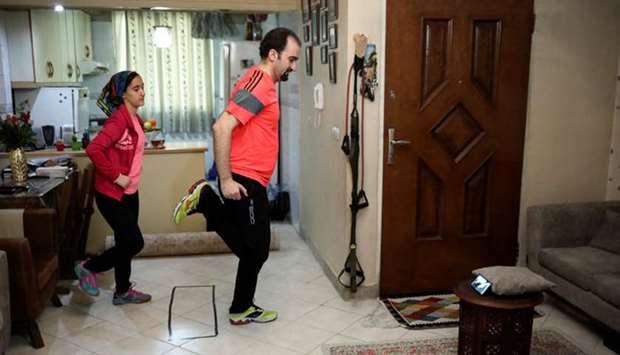Iran yesterday said new deaths from the novel coronavirus remained in double figures for the second day in a row, as the country gradually reopens its sanctions-hit economy.
Health ministry spokesman Kianoush Jahanpour said 94 deaths from the Covid-19 disease were recorded in the past 24 hours, bringing the overall toll to 4,777.
Another 1,512 people tested positive for the illness. That took the total number of infections to 76,389, Jahanpour said, noting that 49,933 of those hospitalised had recovered and been discharged.
The government of President Hassan Rouhani has struggled to contain the outbreak that emerged two months ago.
It shut schools and universities, postponed major events and imposed a range of other restrictions, but it has stopped short of ordering lockdowns.
Iran allowed small businesses outside Tehran to reopen on Saturday and is set to extend the measure to the capital next week.
The move has faced criticism from health experts and even some authorities.
Rouhani and other top officials have argued that the economy must reopen amid diminishing oil and tax revenues coupled with US sanctions on the country.
“We have to fight both the disease and unemployment at the same time,” Rouhani told a cabinet meeting yesterday.
The president announced the sale of a 10% stake in Social Security Organisation’s investment arm, known by its Persian acronym Shasta, on the stock market.
The Tehran Stock Exchange’s website put the holding’s market capitalisation at 688tn rials ($4.3bn) for the offered 8bn shares. Shasta is Iran’s biggest holding company with stakes in industries as diverse as construction and pharmaceuticals.
The offering is expected to raise a significant amount of cash for the government, without it giving up control to appoint managers and board members. Iran expects to produce 14mn tonnes of wheat by March 2021, President Rouhani said yesterday, adding that the coronavirus outbreak had not hit its farm sector and Iranians did not need to worry about food supplies, Reuters reported.
“Our forecast is some 3.5-4% increase in agricultural products and we predict production of 14mn tonnes of wheat during this (Iranian) year,” Rouhani said during a televised cabinet meeting.
“This year our situation is better than previous years. Our people should not be worried about food supply...We have enough stocks,” he said.
Rouhani said Iran’s domestic grain production had been boosted by heavy rainfall that could cover its needs until the next Iranian year, which starts on March 21, 2021. “We also forecast production of 2.6mn tonnes of rice and 1.7mn tonnes of sugar this year,” he said.
US sanctions reimposed since 2018 when Washington exited the country’s 2015 nuclear deal with six world powers have targeted Iranian oil sales and financial activities. Food, medicine and other humanitarian supplies including animal feeds are exempt.
But Iranian authorities say the sanctions have deterred some foreign banks from doing any Iranian business, including deals such as food shipments.
Iranian Foreign Minister Mohamed Javad Zarif said the U.S.”maximum pressure” policy against Iran is killing people and compared it to US President Donald Trump’s decision to stop funding the World Health Organisation.

Majid and his daughter train at their home as they watch online workouts, following the outbreak of Covid-19, in Tehran.
